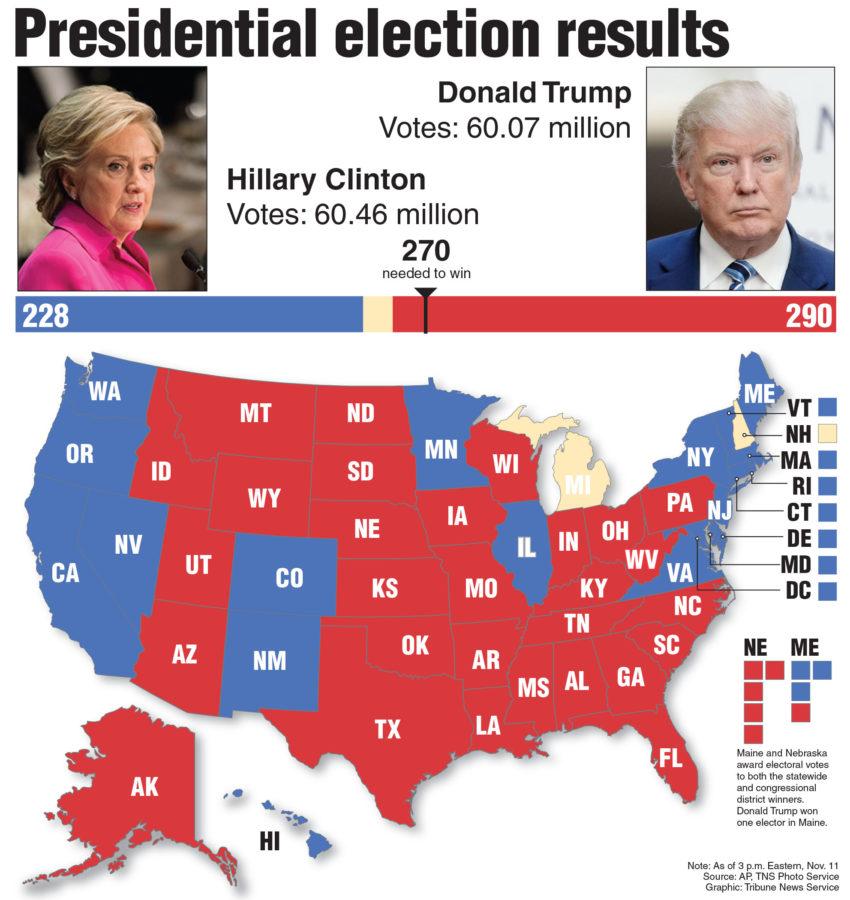Joint column: Conservative election anaylsis
Above is a map of the Presidential election results. Columnists Kyle Day and Leziga Barikor team up for a Conservative analysis of the election results.
Nov 17, 2016
In the wake of the widely-considered surprising results of the past US elections, many have endeavored to explain what happened this cycle and why.
We wish to offer our own interpretation of the events of the past two years (and some time beyond that, as well), one we think will be more reconciled to the facts (and more charitable to voters) than the ones offered by the American left at large.
First, let us address the political reality: Hillary Clinton was simply a terrible choice for a presidential candidate. While her experiences may have uniquely qualified her to perform the duties of the office, they were just not what the American public was looking for this year, and everyone, even the Democratic leadership, knew it.
Not only was she entrenched in the political establishments of both D.C. and N.Y.C., she was also irrevocably marred by decades of legitimate (though often exaggerated) criticism over scandal after scandal involving abuses of power and public resources for which she (and her husband) seemed to get off scot-free practically every time.
Her very path to the presidential nomination of her party was tainted with the perception, prior to Wikileaks confirmation, that Clinton is a woman who could and would do anything she thought she could get away with in the pursuit of political power.
The DNC and their delegates knew all of this, and yet they chose her.
Perhaps the best proof of her terrible choice as a candidate is this: a real-life Scrooge McDuck was recruited by Bill Clinton himself to run for the GOP presidential nomination, presumably in the hopes that he would be the candidate least likely to defeat Hillary, and he still defeated her.
And he did so by keeping on track remarkably well with the electoral success experienced by his predecessors, while Clinton received a full ten million less votes than what President Obama received in 2008. The Democrats (especially their leaders) have no one to blame but themselves.
But as important as the political reality is, the underlying cultural dynamics are even more important.
American politics has been infected, for a while now, with an “Us” vs “Them” mentality. This is, of course, neither new nor unique to our time, though there’s little doubt that the mentality has intensified in recent decades. For many liberals, the main popular media was part of “Us” but for conservatives, it was always a matter of being “Them.”
The problem being, of course, that everyone wants to qualify as “Us” without giving up their ideals. Conservatives want to see different techniques used to solve the same problems that all Americans are facing. Those differences are the reason America has political parties, but these different ideas are not all being treated equal.
Popular left-leaning news satire host of HBO’s Last Week Tonight, John Oliver, said candidly in his final Nov. 13 show, “Now if you’re like me, the implications of this [2016 election] have been hitting you in waves.”
“If you’re like me.”
The words barely seem to impact the audience, but for those not like Oliver, for those who are not one of “Them,” what exactly are you?
Are you “Other”?
Even if you’re a #NeverTrump conservative (as I, Kyle, am), or fit into the laundry list of the liberal protected classes (as I, Leziga, am a woman, immigrant and ethnic minority), the alienating effect is the same.
Oliver’s remarks are merely the most benign of the sort we’re describing. Far worse as been said, and loudly so. Remarkably, though, these election results have caused a handful of liberals to fess up to the problems within their own rhetoric. Liberal news satirist Jonathan Pie (actual name Tom Walker) from the UK summed up his feelings on the US election by fully placing the blame on the political left, in a now viral rant.
“We don’t debate anymore because the left won the cultural war,” Pie said. “So if you’re on the right, [according to the left] you’re a freak, you’re evil, you’re racist, you’re stupid, you are a ‘basket of deplorables.’ How do you think people are going to vote, if you talk to them like that?”
Not all liberal rhetoric promotes these one-sided labels, just like how not all the people who voted for Trump fit them. But when it comes to defending their political counterparts down the aisle, you’d be hard pressed to find many mainstream liberals willing to correct others who speak in these sweeping generalizations.
It has been a long time coming. But 2016 has signaled that the conflict of America’s political subcultures has reached a boiling point, becoming so hot that not even being called a “racist,” arguably the worst accusation a person can receive today, with the slightest degree of legitimacy was powerful enough to keep a man away from the White House.
The political left is now in a good position to listen to us, whether they like it or not. There is a dialogue that needs to happen, and it can’t happen while they continue to blame broad “systemtic oppressions,” or throw on labels to the majority half of the country that voted Trump.
The left lost because not only did they bring nothing new to the table, they looked at those with opposing ideas and said, “You can’t sit with us.”
But we fought for and won our seat at the table. And we invite (as I, Kyle, did in my very first column for the NI) the American left, including many of our own fellow UNI community members, to meet their own standards of diversity, tolerance and inclusion; and do their part to begin and maintain a true conversation, not a monologue, about real political differences, an authentic debate, not a lecture, in which opinions are presented, clash and even forged.









